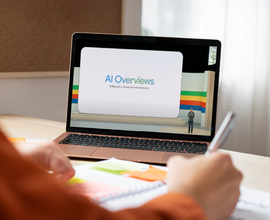2025 AI Search Trends: The Future of SEO & Content Marketing
The most important SEO trends for 2025 center around adapting to the proliferation of AI Overviews and AI answer engines, shifting focus from traffic metrics to conversion quality, and prioritizing an always-on approach to technical SEO.
As the search landscape undergoes its most significant transformation since the inception of search engines, digital and content marketers must embrace AI tools strategically within their workflows, create original content with unique perspectives that demonstrate expertise, diversify content distribution channels, and incorporate video content to maximize visibility across all search formats.
What is the future of SEO and content marketing in 2025?
The search landscape has changed more over the last 12 months than it has since the inception of search engines. Google's AI Overviews (AIO), answer engines like Perplexity, and shifting success metrics have created challenges and opportunities unlike anything seen before.
We cut through the noise with actionable insights on what to prioritize—and what to ignore—as you navigate this transformed digital ecosystem. We've gathered expertise from industry leaders to help you not just survive these changes but leverage them to outperform your competitionCompetition
Businesses generally know who their competitors are on the open market. But are they the same companies you need to fight to get the best placement for your website? Not necessarily!
Learn more in 2025 and beyond.
Is SEO dead?
SEO isn’t dead, it’s just different.
To emphasize Pat’s point: No, SEO isn’t dead, but it is evolving rapidly, and it will never be the same.
The expansion of Google’s AI Overviews and answer engines like Perplexity and ChatGPT Search are changing the way people ask questions and find information, which is, in turn, transforming the search landscape.
As new terms and buzzwords emerge—like SXO (Search Experience Optimization), AEO (Answer Engine Optimization), GEO (Generative Engine Optimization), or traffic optimization—it’s important to remember the core principle of SEO remains the same, no matter what you call it. Companies need to create exceptional experiences that satisfy user intent, deliver value to customers, and align with how search/answer engines surface information to increase brand visibility and awareness.
What is changing are the metrics and numbers search experts previously relied on. Organic traffic numbers and keywordKeyword
A keyword is what users write into a search engine when they want to find something specific.
Learn more rankingsRankings
Rankings in SEO refers to a website’s position in the search engine results page.
Learn more are now directional indicators rather than definitive measures of success.
What matters now is creating sustainable, adaptable systems rather than relying on individual tactics or team members.
SEO has gone from a singular profession to a company-wide practice. A lot of people are going to start looking at the necessity to build a system that will outlast any individual person. And any SEO that is not thinking that way is thinking the wrong way.
SEOs have to change from doers to influencers now. They have to educate and evangelize vs. pressing buttons.
The brands that embrace change by adapting to the new AI search landscape and leveraging AI for automation and efficiency benefits rather than fighting it will be set up to thrive.
Automation is not the enemy. Generative AI has been one of the greatest productivity tools that has ever happened to me in my entire career. People that embrace it are the ones that are going to do well.
Every major shift in search has led to adaptation, not extinction. This AI search disruption may be the biggest yet, but it's bringing opportunity, not apocalypse.
Top SEO trends & predictions to prioritize for 2025
1. AI Overviews to expand to all queries.
AIO, Google’s AI-powered search resultSearch Result
Search results refer to the list created by search engines in response to a query.
Learn more type, now has over 1 billion users. Google announced that the upcoming iteration will be a new experimental search mode known as AI Mode .
AI Mode will be able to answer more complex queries by using advanced reasoning and thinking/multimodal capabilities, which will build on AIO’s momentum to disrupt the way people get information. But more on that in our next prediction.
Let’s focus on what this AIO expansion means for search queries, rankings, and CTR in 2025 and beyond.
Expect many new developments around AIO, like AIOs for commercial queries, and as we’ve recently seen—Google testing ads within AI overviews. The former will decrease visitors, and in the case of the latter: these ads will push organic results even further down the SERP.
In short, AIO will expand to incorporate ad types and appear more often for all types of queries, while LLMs will get better at understanding what users are searching for and why, paving the way for AI Mode’s future launch.
What Gemini is allowing Google to do is what they've always talked about wanting to do: correctly matching a user's query and intent to the most relevant piece of content in their index. The SERP will eventually become completely AI-driven / generated.
Keyword rankings and ranking positions on SERPs will lessen in importance as brands focus more on aligning content with search intent in a brand awareness play to secure brand mentions in AI-generated answers.
The days of positional obsession—hyper-focusing on specific positions on SERPs—are coming to an end. We’re rapidly moving to a future where traditional search engine rankings are less relevant with the expansion of AIO and rise of answer engines.
- Find out which industries AI Overviews impacts most and the prevalence of AIO results across query types in our monthly analysis, which provides exclusive data sourced from Conductor Intelligence.
- Learn more on how to educate leadership about the changing search landscape in this blog by resident SEO expert Pat Reinhart.
- Dive deeper with these 10 actionable strategies you can implement today to optimize your content for AIO and answer engines from Caroline Wilson, Customer Success Manager at Conductor.
2. Answer engines are the new search frontier. Optimize accordingly.
Emerging answer engines—Perplexity, ChatGPT Search, and the forthcoming AI Mode from Google—are the future of search.
As more users start their searches on these answer engines, agile brands are looking to optimize their websites and content to ensure they are the source behind the answers these AI-powered search engines provide.
SEO success is no longer just about ranking for clicks—it’s about positioning your brand as the AI’s go-to source.
So, what optimization efforts should you focus on?
Along with prioritizing fundamental SEO best practices, aligning efforts with Google’s E-E-A-T framework is key. Prioritize educating SEO and content collaborators on the overall concept, what it entails, and why it’s more important with the expansion of AIO.
Optimizing for LLMs or AI Overviews aligns with traditional SEO best practices. The fundamentals haven’t changed: create helpful content, structure it properly, and build brand authority.
Do that, and you’ll show up in both search results and AI-driven answers. Stop overcomplicating it.
Creating original, authentic, and helpful content—the Expertise element within E-E-A-T—should be a top priority moving forward to increase digital visibility and brand authority across all search engines.
Optimizing for LLMs is not that different from a traditional search engine. You just have to be more targeted. The best way to optimize is to be original.
Do this by having folks in your organization provide a unique POV on a relevant topic. This should be the focus because that is what all of these LLMs and answer engines are trying to do: connect real people with real experts’ opinions. Because AI doesn't make things up yet, right? It just regurgitates and stitches things together that already exist.
The good news is that Google seems in favor of incorporating more website links within AI Mode results—at least according to the latest Google Labs visualizations —compared to what we’ve seen with AIO. You can keep your brand top of mind when users are ready to convert by becoming the cited source and showing up in the links AI Mode highlights.
- ICYMI: Learn 10 actionable strategies to optimize your content for AIO and answer engines in this expert article by Caroline Wilson, Customer Success Manager at Conductor.
- Ready for an in-depth resource? Access our AI Visibility Guide to learn which specific factors impact AI search visibility, learn how to measure visibility on AI answer engines, and get actionable content & technical strategies to maximize AI search visibility.
- Looking to build an AEO center of excellence? We've got just what you need. Access our Enterprise AEO CoE Playbook eBook for step-by-step guidance on the key roles, metrics, and changes to make to transition dated SEO efforts to a comprehensive program.
3. Organic traffic panic continues as zero-click searches rise. Shift focus from traffic to conversions.
Expect organic traffic to fall as zero-click searches continue to rise, thanks to users getting more queries answered directly on the SERP.
If you’re seeing significant drops in organic traffic since AIO rolled out, you’re not alone. Check out our case study on our own website (conductor.com) to see how it’s impacted our traffic so far.
We're at an inflection point or really an impasse here where there's going to be a shift in how people look at success when it comes to organic traffic.
Zero-click searches will rise. Traffic will go down. What I think this is going to do is force people to think more about conversion and the quality of traffic vs. just traffic in general.
Organic traffic is quickly shifting from a key SEO metric to a directional metric. Forward-looking SEOs and digital marketers should focus on resetting expectations with leadership regarding which ROI metrics they focus on and why.
When people come to your site, are they engaged? What's their time spent on site? Are people engaging more deeply with your content, and, ultimately, is that leading to more conversions?
That is what the new success metrics will look like in organic.
Additionally, brand demand, brand mentions, and branded traffic will become more important metrics to understand digital visibility and performance in an AI-powered answer engine future.
You will lose traffic to things like glossary and generic content, but if you’re creating the right type of helpful, original content, you will get more of the right traffic to your website—AKA those ready to convert.
People are still so focused on how much organic traffic they're driving when they should be focused on driving quality traffic that converts.
Take, for example, the recent Hubspot case—they saw a massive drop in organic traffic , but I don't think it has had that much of an impact on converting visitors to trials, prospects, and revenue because, at the end of the day, they are primarily losing vanity visitors that weren’t driving revenue.
The implications are clear: successful SEO in 2025 requires shifting focus from organic traffic volume and SERP rankings to conversionConversion
Conversions are processes in online marketing that lead to a defined conclusion.
Learn more quality. This means:
- Educating leaders on the metrics that matter moving forward
- Prioritizing conversion optimization over traditional traffic metrics
- Developing deeper understanding of user’s search intent to inform your content strategy
- Creating original, unique content with authoritative authorship
The key to thriving in this AI-dominated landscape is truly understanding the search intent of your target audience and solving their problems more thoroughly in your content than the competition.

Which SEO trend to ignore?
Now, to the fun part: the SEO trend you can ignore or, at the very least, deprioritize.
Heavily keyword-driven SEO strategies.
Everyone in SEO loves a good keyword, but it’s time to move beyond an SEO strategy focused exclusively on keywords and SERP rankings.
People need to think in terms of topics rather than keywords. Keywords are still important, of course, because users drop them into their favorite search engines, but answer engines and LLMs rank topics.
To be clear, tracking and reporting on keyword and SERP rankings can still be a helpful indicator of the effectiveness of your overall strategy.
There’s nothing wrong with understanding where you're ranking and what you're ranking for; it just shouldn't be the only thing you're relying on. Keywords should be an adjacent metric that helps give you an overall idea of brand visibility and where you’re appearing.
In other words, tracking keywords still has value—but making them the centerpiece of your strategy will set you up for failure moving forward.
Top content marketing trends & predictions to prioritize for 2025
Let’s talk about what the future of content marketingContent Marketing
Content marketing is a marketing discipline with the goal of increasing awareness and scope for products and brands in the desired target group with content published on the web and offline.
Learn more has in store for 2025 and beyond.
1. Higher quality content creation powered by AI.
As GenAI tools improve and elevate the quality of the content they can produce, content marketers need to adapt and embrace them throughout the content workflow to drive results. However, thorough editing and review processes are still needed to catch hallucinations or factual inaccuracies in AI-generated content.
I think people need to not be so scared of AI. There are a lot of creative ways you can use AI for content.
But, on the other hand, you also shouldn’t take it at face value when it generates content on its own.
The key is finding balance—using AI to handle repetitive tasks while preserving the human creativity and expertise that make your content distinctive. Instead of seeing AI as a threat, view it as a tool that can free you to focus on adding unique value through your brand's perspective and expertise.
It’s not about dropping in a generic prompt and hitting publish on whatever the AI spits out. Instead, it’s about leveraging generative AI where it makes sense within your content creation workflow to boost efficiency and offset skill set or resource gaps.
Increase experimentation with these tools for topic research, content gap analysisContent Gap Analysis
A content gap analysis is a strategic method for checking and optimizing the content of a website.
Learn more, title tag and meta descriptionMeta Description
The meta description is one of a web page’s meta tags. With this meta information, webmasters can briefly sketch out the content and quality of a web page.
Learn more versioning, and other content creation steps.
As AI-generated content quality improves, content folks will also start to shift their role from primarily writing-based to more of a hybrid editor and supporting writer role.
I think what we're going to see this year, but also the years after, is that these AI writing tools are going to get better and better.
Right now, these tools are our sidekicks. It could very well be in a couple of years, it's the other way around. Where we are letting these AI tools do the legwork and that you're essentially just editing the AI’s work. Many translators are already being handed AI-translated content for editing.
As AI is integrated into more content workflows, ensuring content quality should be the primary focus for content marketers.
Conductor’s Content Score in Writing Assistant measures content quality with comprehensive evaluation criteria across topic coverage, readability, syntax, content objective, how well it answers related questions, and more to ensure it’s optimized for success from day 1. Start your 3-week free trial today to see Content Score in action.
2. Video, video, video.
Video result types were the fastest-growing search engineSearch Engine
A search engine is a website through which users can search internet content.
Learn more result type analyzed in our annual Benchmarks Report. Video isn’t just a nice-to-have anymore—it’s a must-have in any content strategy to stay competitive in search results and engage audiences across generations.
Video is dominating search results. If you’re not thinking about how to integrate it into your content strategy, you’re already behind. And make sure you host it on YouTube—not your website or Vimeo. Google prioritizes YouTube above all other platforms.
The shift in search visibility of video result types presents a significant opportunity for brands to capture audience attention in new ways.
Creating short-form and long-form video content enhances visibility in SERP result type features, as AI Overviews often pull from video and Google has been showing video result types directly on Page 1.
This evolution requires content marketers to think beyond traditional written formats and strategically incorporate video content to maximize visibility. Develop niche, topic-specific videos that address your audience's questions in a visual format. These can serve as complementary pieces to written content or standalone as valuable resources.
Just like written content, the most successful videos provide unique perspectives and demonstrate genuine expertise. Don't just repurpose what's already out there—bring something fresh to the conversation through your video content.
Instead of treating video as a separate initiative, look for natural opportunities to incorporate it within your current content workflows:
- Add explanatory videos within complex how-to guides
- Create video summaries of comprehensive reports or studies
- Develop visual demonstrations of products or services
- Use short clips to highlight key statistics or insights from longer content
The brands seeing the most success with video aren't just creating standalone content—they're strategically using video to enhance their overall content experience and capture visibility across multiple search formats.
By diversifying your content formats to include video, you increase your chances of appearing in more search results and provide your audience with content in their preferred format—creating a more user-friendly experience that drives better results.

Which content marketing trend to ignore?
You know what to prioritize. Let’s get into the content marketing trend you can ignore in 2025.
AI-generated, generic content at scale.
Creating huge volumes of AI-generated content will not improve digital visibility in 2025 and beyond.
Content marketers need to re-educate leadership on this notion that you can generate vast amounts of AI-generated content and expect it to be high quality. If it were that easy, everyone would do it.
You don't necessarily need more content. You just need to make sure that the content you do create hits all the right notes.
Google's stance on AI-generated content supports this:
If you look at the guidance from Google on AI-generated content, it’s clear that they aren’t against AI-generated content, but they do emphasize using it wisely. At the end of the day, you want to make sure that your content is helpful, experience-driven, original, and resonates with your audience.
Remember that search engines are actively reducing the amount of content they index, not looking to add more.
Google doesn't have any appetite to discover, crawl, and index even more content because it's super expensive for them. So they're pruning their index and raising the content quality bar. In no world would Google want more generic, low-quality content.
What’s ahead for SEO and content marketing in 2025
The winners in the search landscape of 2025 and beyond will be brands prioritizing conversions over traffic, quality over quantity, and strategic AI integration rather than resisting it.
As answer engines reshape how users find information, success demands original content with genuine expertise, technical excellence, diversified distribution strategies, and video integration. The most significant search disruption in history isn't the apocalypse some feared—it's an opportunity for adaptable brands to thrive.


![Patrick Reinhart, VP, Services and Thought Leadership, [object Object]](https://cdn.sanity.io/images/tkl0o0xu/production/9bc72298b24ad01b732de4c3376f79546d20f81c-3542x3542.png?fit=min&w=100&h=100&dpr=1&q=95)
![Steven van Vessum, VP of Organic Marketing, [object Object]](https://cdn.sanity.io/images/tkl0o0xu/production/d620adbfe9e9395fae2e2ac9089b074947c25589-585x585.jpg?fit=min&w=100&h=100&dpr=1&q=95)
![Wei Zheng, Chief Product Officer, [object Object]](https://cdn.sanity.io/images/tkl0o0xu/production/dcfa62c0fe34ba0c31f910b818874cd160ad8839-3542x3542.png?fit=min&w=100&h=100&dpr=1&q=95)
![Seth Besmertnik, CEO and Co-Founder, [object Object]](https://cdn.sanity.io/images/tkl0o0xu/production/79e6eda2a43959d9ac71253ccff188677b8260d8-3542x3542.png?fit=min&w=100&h=100&dpr=1&q=95)
![Zack Kadish, SEO Lead, [object Object]](https://cdn.sanity.io/images/tkl0o0xu/production/72f6994cf52374799c3d01d5dd3dc070f05ee261-300x217.jpg?fit=min&w=100&h=100&dpr=1&q=95)
![Shannon Vize, Sr. Content Marketing Manager, [object Object]](https://cdn.sanity.io/images/tkl0o0xu/production/bde57d59c377cf4297300ba4181a876520044f2d-300x290.jpg?fit=min&w=100&h=100&dpr=1&q=95)





